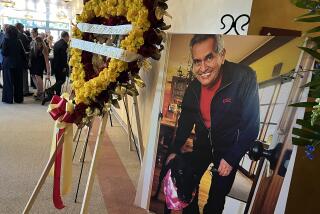A Uniquely Needy Flock Mustn’t Lose Its <i> Padre</i> : Latinos: The pending reassignment of Father Luis Olivares threatens to leave : Los Angeles’ immigrant pilgrims feeling like orphans.
When Roger M. Mahony became archbishop of Los Angeles, there were high hopes that the archdiocese would turn its attention to Los Angeles’ burgeoning Latino population. The scheduled reassignment of a popular Latino priest, Father Luis Olivares, threatens to return us to the days of Cardinals James Francis McIntyre and Timothy Manning.
It was 20 years ago this Christmas Eve, at St. Basil’s on Wilshire Boulevard, that Chicano activists protested what they considered Cardinal McIntyre’s neglect of their growing community. A confrontation ensued and a dozen demonstrators were arrested.
At the time, significant changes were occurring in the Roman Catholic Church. Unhappy about their church’s lack of social commitment, encouraged by the reforms of Pope John XXIII and the spread of liberation theology in Latin America, and inspired by the heroics of black Protestant ministers in the civil-rights movement, Latino priests and nuns pressed for an expansion of their ministry to poor Latinos. Many of these priests and nuns worked in the Los Angeles archdiocese, then one of the most reactionary in the country.
In San Antonio, by contrast, Archbishops Robert Lucey and Francis Furey had for 40 years built an environment to empower Mexican Americans. Outspoken critics of racism and advocates of trade unionism, they paved the way for the appointment of Patrick Flores as San Antonio’s first Mexican American archbishop and helped Mexican Americans gain control of city government in the late 1970s.
This is the tradition of church activism that Olivares brought to Los Angeles and that still imbues his ministry. He was an early supporter of Cesar Chavez and the farmworkers. As pastor at Our Lady of Soledad in unincorporated East Los Angeles, he helped organize the United Neighborhood Organization, a grass-roots group seeking to expand Latino influence.
In 1981, Olivares became pastor of Our Lady Queen of the Angels, the city’s oldest Catholic Church. Once a symbol of Spanish colonial domination, La Placita, as it is known, became a refuge for poor Mexicans who were unwelcome in English-speaking parishes like St. Vibiana and St. Vincent.
Olivares arrived at the church when waves of Mexican and Central American pilgrims, in a modern-day Christmas tale, were seeking sanctuary in this 20th century Belen. Mindful of La Placita’s historical significance and of the importance of giving people hope, Olivares opened the church’s doors to the refugees. His message was clear: How can you show love for a God that you cannot see if you show no love for your fellow man?
During his eight years at La Placita, Olivares has become the symbol of the Christ who kicked the Pharisees out of the temple rather than the Jesus who ate at their table. An adamant critic of U.S. involvement in El Salvador, he declared his church a sanctuary in 1985. He forged strong links with labor and community organizations, reinforcing their commitment to peace with justice. He has been threatened by Salvadoran death squads based in Los Angeles.
It thus shouldn’t be difficult to understand why the transfer of Olivares to Fort Worth, Tex., if allowed to go forward without an appeal, would be interpreted by Latinos as a weakening of the church’s commitment to the cause of social justice. For many of us, it would also mean a loss of faith. When a child, I often prayed “Please help me God!”, and I knew He would. As I grew older, doubt crept into my prayers. “Please God, help me if you can!” evolved into “Please God, if you’re there!” Olivares made me and many others at least listen again, for there was never any doubt that Olivares was there and would help if he could.
Finally, his departure in July would come at a critical time in La Placita’s history. Plans are under way to redevelop the area, including the conversion of the plaza into a tourist haven. Many fear that without Olivares’ leadership, Our Lady Queen of Angels will become part of the “Old Town” landscape.
Yet Olivares need not have to leave. His order’s decision to transfer him can be appealed.
Archbishop Mahony’s most severe critics concede that he is an improvement on his predecessors. His past differences with Olivares may stem from a clash of different traditions. Even so, the archbishop displayed considerable courage in personally taking medical aid to El Salvador. We hope he will summon similar courage and request that the Claretian order allow Olivares to continue giving posada (lodging) to the modern-day pilgrims coming to Los Angeles.
More to Read
Sign up for Essential California
The most important California stories and recommendations in your inbox every morning.
You may occasionally receive promotional content from the Los Angeles Times.










